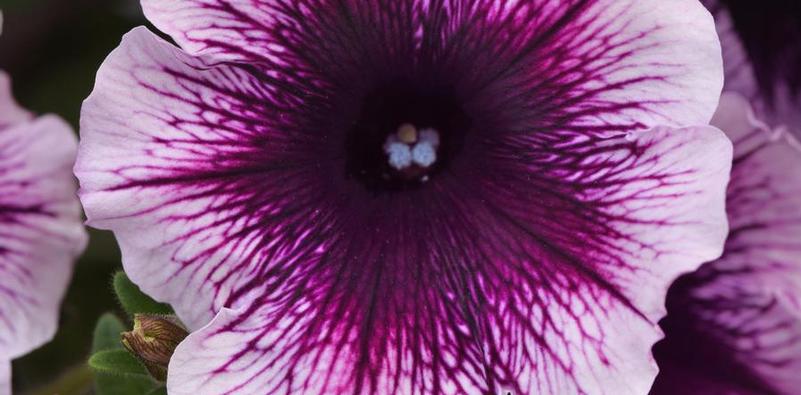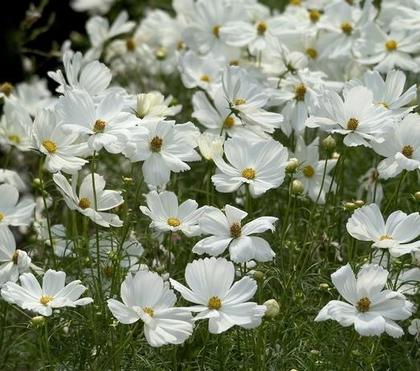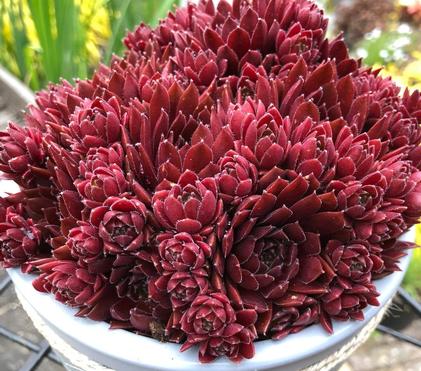3 'P's – Petunias, Pelargoniums, and Potatoes: answers to some frequently asked questions
Wallish staff answer a lot of questions from our wonderful customers every day, but there are just some questions that keep coming up more often than others. So, here is some information that may help you select your plants with greater confidence.

3 'P's ? Petunias, Pelargoniums, and Potatoes: answers to some frequently asked questions
I love petunias, but I hate deadheading them. Which ones should I choose?
Any of them! None of the petunia varieties we grow require deadheading as they will self-clean. This means that the blooms will simply dry up and fall off. Their trailing relatives, the Calibrachoas, aka Million Bells, that we grow in baskets do the same. You can tidy them up if they are in a high visibility location such as a container on your deck, or if you need a repetitive garden therapy session, but you do not need to do so as they have been bred to bloom continuously. The Wave, or trailing, petunias will grow wide and fast for stunning colour in a hanging basket or as a groundcover. The Madness series is known for its profusion of blooms while the Headliners grow into mounds of blooms reminiscent of the night sky. Last, but not least, the Picobellas are perfect little plants for small containers or a narrow border.
What’s the difference between a zonal geranium and a seed geranium?
Most of our annual geraniums are zonal geraniums, they are just propagated differently. The big plants in the 6” pots are grown from cuttings and the seed geraniums in the six-packs are grown from seed. Zonal simply means that the leaves have varying shades or patterns on the leaf. Seed geraniums are more compact plants with many blooms that are perfect for a border planting or smaller containers. The Dynamo, Fantasia, Galaxy, Moonlight and Sunrise series are larger, taller plants with bigger blooms in vibrant shades of red, orange, purple, and pink. Occold Shield, Vancouver Centennial, and Wilhelm Langguth are zonal, but in a sub-category known as fancy-leaf or brocade. The Ivy geraniums are in their own category and have waxier leaves and a trailing habit which makes them ideal choices for window boxes and containers. Then there are the Calliopes of the giant leaves and huge, brilliant blooms, and the Calientes with their more open habit and airier flowers. The latter two varieties are Interspecific – crosses between zonal and ivy geraniums. And then there are the Regal Geraniums, aka the Martha Washingtons, which perform best in cooler weather.
Potatoes – Determinate vs. Indeterminate
We’ve been having this conversation on the sales floor a lot recently, so I thought it might be a good time to dig a little deeper. Although potatoes and tomatoes are in the same family (Solanaceae) the common terms (determinate, indeterminate) that are used so effectively to describe the growth habit of tomato plants are not as pertinent to potatoes. Early season, mid-season, and late season are better descriptors, and more useful knowledge in terms of our local growing conditions. All potatoes need to be hilled or trenched as the plant grows, and its underground stems (stolons) swell into tubers. The key thing is to keep the developing tubers covered with soil and out of the sun to avoid greening (which makes that part of the potato inedible). The other important aspect of selecting a potato is to pick a variety that is best for the ways in which you like to prepare them. Storage may be an important aspect to consider as well.
The following varieties will be available while supplies last:
Bintje – late season, yellow flesh, all-purpose, excellent storage
Dark Red Norland – early season, red skin, white flesh, boiling, frying, high yield, good storage
Kennebec – mid to late season, white flesh, excellent all-purpose, excellent storage
Russet Burbank – late to very late season, white flesh, all-purpose, excellent storage
Russet Norkotah – early to mid-season, white flesh, best for baking, good storage
Sangre – mid-season, red skin, white flesh, excellent for boiling and baking, excellent storage
Yukon Gold – mid-season, yellow flesh, good all-purpose, good storage

